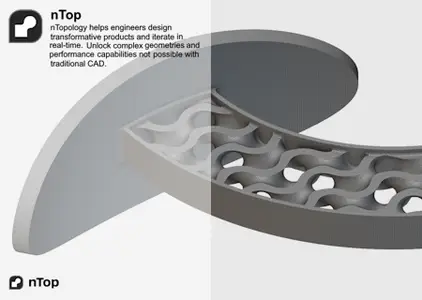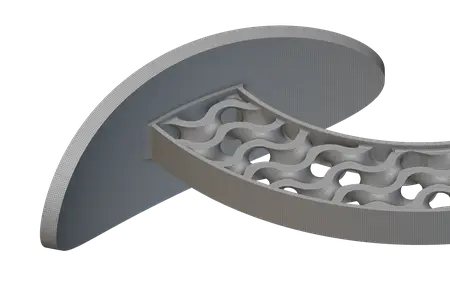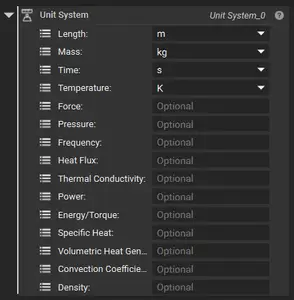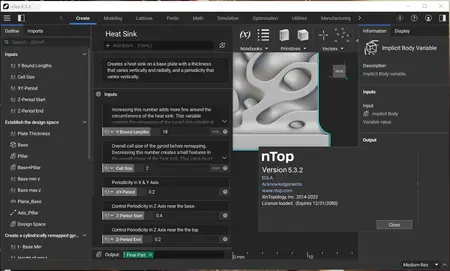
Free Download nTopology 5.3.2 | 1.7 Gb
nTopologyis pleased to announce the availability ofnTopology 5.3.2. This release features our new Mesh from Implicit Body 2 block, which uses our new experimental approach and bug fixes
Owner:nTopology
Product Name:nTopology
Version:5.3.2
Supported Architectures:x64
Website Home Page :www.ntop.com
Languages Supported:english
System Requirements:Windows *
Size:1.7 Gb
.
nTop 5.3 – What’s New
Mesh from Implicit Body 2 eta
A new, experimental approach to meshing implicit bodies.
– Block Name: Mesh from Implicit Body 2
– Location: Beta > Utilities
– Description: Convert an Implicit Body to a Mesh
. Body: Implicit Body to mesh.
. Tolerance: The maximum allowable deviation of the Mesh from the implicit geometry.
. Output: Mesh
An example of a mesh generated with the new Mesh from Implicit Body 2 block.

Block Updates
We have updated the Unit System block to include units for Pressure, Frequency, Heat Flux, Thermal Conductivity, Power, Energy/Torque, Specific Heat, Volumetric Heat Generation, Convection Coefficient, and Density for CAE Interoperability. If Compound units are not provided, the base units (Length, Mass, Time, Temperature) will be used to construct the Compound units.

Bug Fixes
– We fixed an issue with the Equidistant Points on Curve block that caused portions of the curve to contain no points.
– We fixed an issue with the Translate Object block that caused translation to be lost when using the Implicit Body from Voxel Grid block.
– We fixed an issue with the Surface Area block that caused the result to be outside the relative error in certain cases.
– We fixed an issue with the Mesh from Implicit Body block that caused the block to fail with an error in certain cases when sharpening was turned on.
– We fixed an issue with the Export FE Model block that caused temperature units to be exported in Kelvin regardless of the units specified in the unit system block.
– We fixed an issue with the Cyclic Symmetry that caused an error when processing cyclic symmetry.
– We have updated the error message on the Topology Optimization block when zero-volume elements are detected to a warning message so that you can still run it. We highly recommend that element size be reasonable and uniform across the design space and that you use the Min Feature Size input to avoid zero-volume elements in your mesh.

nTopologyintroduced the concept of implicit modeling for mechanical design, which is an innovative, modern, and scalable way define parts and products. It has many benefits to end-users and companies, such as the elimination of model failures, speed of changes or iterations, and scalability to name a few. But implicit modeling enables so much more. In this informational session, we’ll explore a topic that is redefining product development – field-driven design. In short, field-driven design is a way for design, analysis, and manufacturing teams to overlay information into one engineering model. This approach enables orders of magnitude increase in design iteration speed and greatly improves collaboration between teams.
How Field-Driven Design Allows Engineers to Design for Additive Manufacturing
Watch this information session where we’ll define field-driven design, show examples of how it enables better knowledge sharing, and show how it promotes the development of more sophisticated, highly engineered products. You’ll also better understand how nTopology is addressing today’s engineering problems through its nTop Platform product.
nTopologywas founded in 2015 to enable engineers and designers to create any geometry – no matter how complex – and meet the requirements of high-performance products.










Leave a Reply
You must be logged in to post a comment.